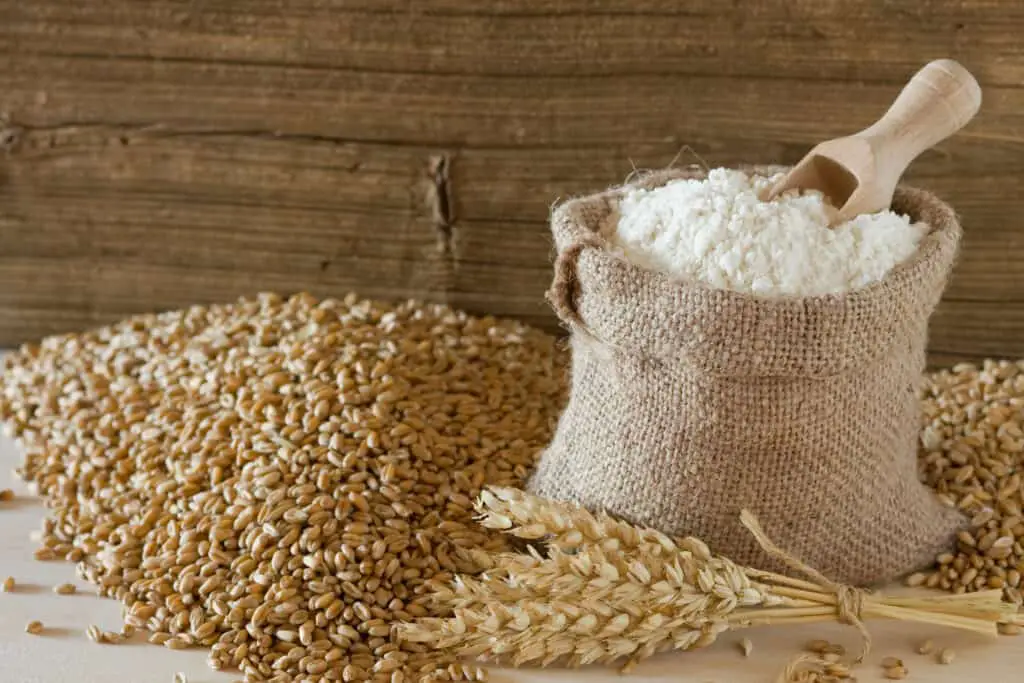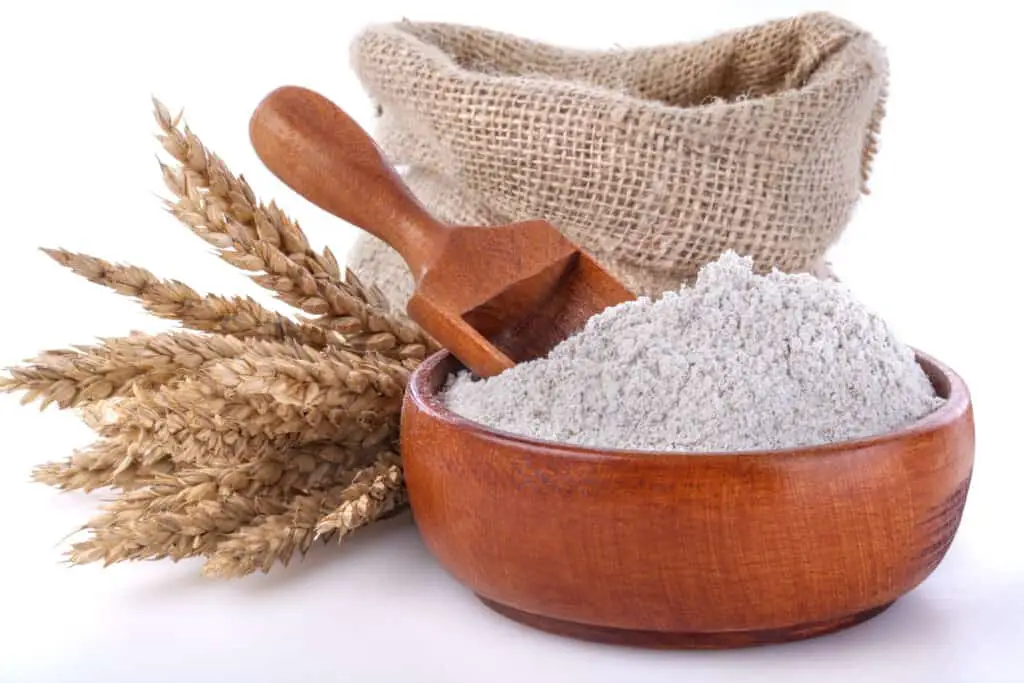Whole wheat flour is made of the entire grain of wheat, which includes bran (the outer coating) and germ (a nutrient-rich center). It has more protein than white flour but less sugar. White flour comes from stripping away all parts of the grain except for the endosperm, whereas whole wheat flour retains much more nutrients in its production process.

Nutritional Facts
One hundred grams of whole wheat flour has 343 calories, 75 grams of carbohydrates (with 25 grams of dietary fiber), 12.14 gm protein, and 0.01 mg vitamin B12. The same amount of whole wheat flour has 0.20 mg iron, 0.36 gm calcium, and 2730 IU vitamin A.
There is a small amount of sodium in whole wheat flour- 0.01 mg per 100 gms, compared with 0.04 mg in white flour.
Is Whole Wheat Flour Healthy?
Whole wheat flour is a healthier option because they are less processed and have more nutrients. In addition, whole wheat flour is a good source of protein, dietary fiber, vitamins, minerals, and antioxidants.
Low in Sodium
Whole wheat flour is healthy for people on a low-sodium diet because 100 gms of white flour has 0.04 mg sodium while the same amount of whole wheat flour has 0.01 mg of sodium.
More Protein and Dietary Fibers
Whole wheat flour is also healthy because it contains more protein and dietary fiber than white flour, which helps the digestive system to work correctly. In addition, whole wheat flour does not contain any additives or preservatives. As a result, it is a good source of vitamin A from beta-carotene, potassium from magnesium, and zinc from copper.
Good for Bones
Whole wheat flour is good for bones because it contains calcium, magnesium, and zinc.
Diabetic-Friendly
Whole wheat flour is also diabetic-friendly because it has a low glycemic index. The glycemic index measures how quickly a carbohydrate-containing food raises blood sugar levels.

Is Whole Wheat Flour Better Than White Flour?
There is no definitive answer as to whether whole wheat flour is better than white flour. It depends on the person’s dietary needs and preferences. Some people find that they digest whole wheat flour better, while others prefer the taste of white flour. The main difference is the nutritional value and fiber content – whole wheat flour contains more of both.
Nutrition Wars: Whole Wheat vs. White Flour
Whole wheat flour has a higher amount of calories and carbohydrates than white flour and provides more vitamins, minerals, protein, and dietary fiber. For example, 100 grams or roughly three-and-a-half ounces of whole wheat flour contains about 343 calories, compared to 281 in white flour. The carbohydrate content is also higher in whole wheat flour, with 76 grams per 100 grams than 60 grams for white. However, the most significant difference is in the fiber content – 12 grams for whole wheat flour versus only 0.75 grams for white. This means that whole wheat flour provides nearly 16 times the fiber as white flour.
Both types of flour contain trace amounts of other nutrients, but whole wheat flour is the clear winner in overall nutritional value. It is a good source of thiamin, niacin, and vitamin B-12. White flour does not contain any of these nutrients.
Additives in Whole Wheat Flour
There are no additives in whole wheat flour. It is made from grinding the entire grain and then sifting out only the endosperm part to produce whole wheat flour.
Furthermore, whole wheat flour has a host of nutrients beneficial to our health. The absence of additives means that there are no artificial sweeteners or preservatives. So, if you are looking for a healthy and additive-free alternative to white flour, then whole wheat flour is the way to go!
Whole Wheat Flour and Weight loss
Many people turn to whole wheat flour as a healthier alternative to white flour when it comes to weight loss. Whole wheat flour is lower in calories and higher in fiber than white flour. It also contains more nutrients, such as protein, B vitamins, magnesium, and zinc. According to studies, people who consumed high-fiber diets lost significantly more abdominal fat than those who consumed low-fiber diets.
Whole wheat flour is more satiating than its white counterpart, meaning it can help you feel fuller for longer. This can lead to weight loss in the long run. In addition, whole wheat flour is a complex carbohydrate, meaning it takes longer for your body to break down and absorb. Since the carbohydrates are not broken down as easily, they do not cause sharp rises in blood sugar levels or insulin secretion, leading to hunger pangs and cravings later on. So it is a good choice for looking to lose weight in a healthy way.
Is Whole Wheat Flour Easy to Digest?
Whole wheat flour is also easier to digest than white flour. This is because the bran and germ, which are the parts of the grain removed during the milling process to create white flour, contain dietary fiber and other nutrients that help with digestion. The added fiber in whole wheat flour can help regulate bowel movements and prevent constipation.
Additionally, the nutrients in whole wheat flour can help to support gut health and digestion. Whole wheat flour is a high-fiber food beneficial for gut health. Fiber helps feed the good bacteria in your gut, keeping your digestive system healthy. Additionally, fiber can help reduce inflammation in the gut, which may lead to a range of other health benefits.
Verdict
Whole wheat flour is a healthier alternative to white flour and can help with weight loss in a healthy way. It is also easier to digest than white flour. In addition, whole wheat flour contains high levels of fiber, which are beneficial for gut health, and other nutrients that support digestion. In terms of nutrition, whole wheat flour is a better choice than white flour and does not contain additives. Whole wheat flour can be used for baking, cooking, and also as a thickening agent.
